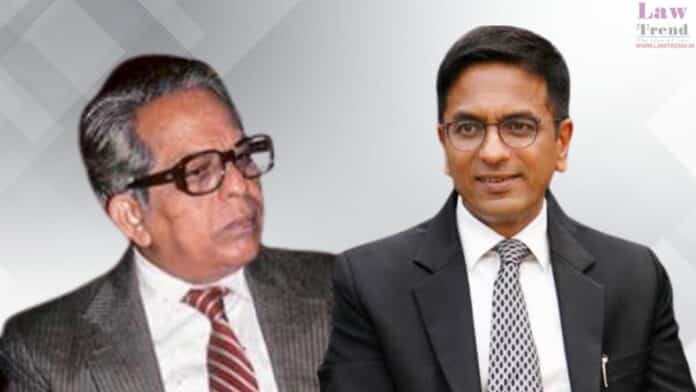In a heartfelt and reflective address, Chief Justice of India (CJI) Dr. D.Y. Chandrachud shared personal anecdotes about his upbringing, the values instilled in him by his parents, and the profound impact of the judiciary on ordinary lives. Speaking at functions organised by the Supreme Court Bar Association (SCBA) o in honour of CJI DYChandrachud who will demit office on November 10.
Justice Chandrachud was sworn in as the 50th Chief Justice of India on November 9, 2022.
A recent event, the CJI shed light on his father’s foresight and wisdom, his mother’s nurturing strength, and the significance of judicial integrity and compassion in serving the common man.
A Father’s Lesson in Integrity
The Chief Justice recounted a poignant story about his father, the late Y.V. Chandrachud, who served as the 16th Chief Justice of India and is remembered as one of the longest-serving CJIs. He revealed that his father had purchased a small flat in Pune with a specific purpose in mind.
“When I asked him why he bought the flat, he said, ‘I know I will not stay in it.’ He told me to keep that flat until I retire as a judge so that I would always know that if my moral integrity was ever to be compromised, I had a roof over my head,” said CJI Chandrachud. The lesson was simple yet profound: moral integrity and ethical principles should never be overshadowed by fear or material insecurity.
A Mother’s Devotion and Strength
CJI Chandrachud spoke about his mother’s unwavering care during his childhood, particularly when he frequently fell ill. Reflecting on her sacrifices, he said, “My mother spent nights after nights ensuring I got well. She used to recite a shloka, which meant medicine is like the Ganges and the doctor is in the position of Narayan. At the time, I didn’t know what it meant—I just associated it with bitter medicine.”
The Chief Justice also humorously noted the strong presence of women in his life, saying, “My mother dominated the home, and now Oriya women also call the shots at home, but she didn’t mess up my judgments.”
Compassionate Justice: Stories That Inspire
Delving into his judicial work, CJI Chandrachud shared cases that reaffirmed the judiciary’s role in transforming lives. He narrated how the Supreme Court intervened to allow two visually challenged candidates to appear for the Rajasthan judicial exams. “After they appeared, we were told they qualified and made it to the select list. That’s what makes us tick,” he said.
He also recalled a case involving a doctor with muscular dystrophy who was denied the opportunity to pursue an MBBS degree despite excelling in the NEET exam. The court ensured the doctor was admitted after medical examination proved his capability. Another case involved the child of a daily wager who nearly missed his admission to IIT due to his inability to operate a credit card for payment. The court directed that he be admitted, ensuring that financial hurdles did not obstruct merit.
“These stories remind us why we do what we do. It’s not just about writing judgments on complex subjects—it’s about the impact we have on the lives of common citizens,” he said.
The Divide Between Bar and Service Judges
Addressing a recurring issue within the judiciary, CJI Chandrachud emphasized the value of diversity in judicial appointments, particularly the contributions of service judges. He acknowledged the perceived divide between bar judges and service judges in High Courts but highlighted the latter’s unique expertise.
“Service judges bring a wealth of knowledge about trial action—they understand witnesses, the evidence mechanism, and how justice is intended to be done,” he said. The Chief Justice stressed that this diversity enriches the judiciary’s collective wisdom.
Lessons in Language and Lifelong Learning
CJI Chandrachud also reflected on his father’s insistence that he take up Hindi in college, a decision that shaped his understanding of diverse perspectives. “He insisted I study Hindi, which was unconventional at the time, but it broadened my horizons,” he said.
Through these anecdotes, Chief Justice Chandrachud painted a picture of a life guided by integrity, compassion, and service. His reflections underscore the deep personal and professional values that drive his vision for the judiciary, making him not just a judge, but a beacon of hope for the common man.
As the Chief Justice continues to uphold the principles of justice, his father’s wisdom remains a cornerstone of his journey, reminding him—and all of us—that integrity is the foundation of a meaningful life.




